Six things you may not know about Michael Collins
As we approach the 100-year commemoration of the death of Michael Collins, historian Pauline Murphy tells us about some of the hidden secrets about the legendary figure.
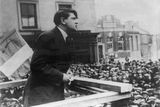
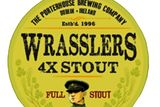
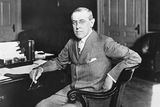

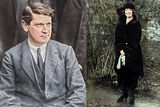
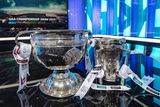
We all know Michael Collins the revolutionary, the statesman, the soldier, but do we know Michael Collins the habitual smoker, the singer, the dog owner? The Michael Collins who wanted to kidnap the US President or the Michael Collins who almost took the emigrant ship to Ameica?
These are just some of the unknown aspects of the most famous man in Irish history.
Chicago's loss is Ireland's gain:
Ireland nearly lost Michael Collins to America in 1915. In the early 1900s his older brother Patrick emigrated to the US where he joined the Chicago Police. Patrick rose up the ranks to captain and secured a job for his younger brother Michael in the First National Bank in Chicago. With his passage booked, the young Michael Collins was all set to leave when at the last moment he changed his mind, or rather the coming revolution changed it for him.
At that time Collins was working in the civil service in London but behind the scenes he was very active in the Irish Republican movement and he returned back to Ireland. When his brother in Chicago sent him news of a job waiting for him in the ‘Windy City’, Collins consulted the old Fenian Tom Clarke who told him it would be better for a young Irishman to stay and fight in the coming revolution. Collins pondered on the move, he had even booked a passage across the Atlantic Ocean but, at the last moment he changed his mind and the emigrant ship left without him.
In a letter to his young brother, Patrick wanted dearly for his younger sibling to come to the land of opportunity, writing ''Michael if you don't take the chance you will never get anywhere!''
Sam Maguire and Liam McCarthy:
The GAA had a big role to play in the making of Michael Collins the revolutionary. In London he played with the Geraldines GAA club and it was through that GAA circle in the British capital that he met two of the GAA's most famous names - Liam McCarthy and Sam Maguire.
Both Maguire and McCarthy were members of the Irish Republican Brotherhood and brought the young Michael Collins into the revolutionary fold. McCarthy was born in London of Cork parents while Maguire was a native of West Cork who worked, like Collins, in the British civil service.
At the age of 19 Collins was sworn into the IRB by McCarthy and Maguire at Barnsbury Hall, Islington. Knowing the abilities of Collins, McCarthy encouraged him to go back to Ireland where during Easter Week 1916 Collins served as Joseph Plunkett's Aide de Camp in the GPO.
McCarthy became an important financial backer of the War of Independence and was one of the first to buy into the Collins led Dáil Loan scheme. He would later use that money to buy a trophy for the winners of the All Ireland Hurling Championship. Today that trophy is the famous Liam McCarthy Cup.
Collins asked Maguire to remain in Britain during the War of Independence where he was put in charge of IRA intelligence there. With the death of Collins in 1922 came a change in circumstances for McCarthy and Maguire.
During the Civil War McCarthy remained loyal to Michael Collins and because GAA clubs in London took the opposite side he lost his influence in the Irish community there. His finances dwindled and so did his health. McCarthy died in 1928.
Maguire also remained loyal to Collins and he secured a job in the newly formed Free State Posts and Telegraphs but, following the death of Collins he found himself at odds with the Free State government and he was dismissed from his job. In 1927 Maguire died in poverty from TB. In 1928 his GAA friends raised money for a new cup to award to the winners of the All Ireland Football Championship and named it after him.
Doing time in Sligo:
The common line of thinking is that the only time Michael Collins spent behind bars was in the aftermath of the 1916 Easter Rising when he was sent to Frongoch Prison camp in Wales with other participants of the rebellion but, just a few years later Collins found himself behind bars again, this time in Sligo.
In the spring of 1918 Collins was touring the north-west drumming up support for Sinn Fein.
The authorities took note of a 'seditious' speech he made in Co. Longford and detectives arrested him when he returned to Dublin. Collins was brought back to Longford to answer the sedition charge but he refused to recognise the court so, he was sent to Sligo Gaol. Collins spent three weeks in Sligo, spending his time writing letters to friends and family and detailing his loneliness in a prison diary.Collins was released after a few weeks but he skipped bail and from then on became a man on the run!
Read more
Bad habits:
The Big Fella was more of a smoker than a drinker. 'Three Castles' was his favourite brand of cigarette which he grew fond of when he was working in London as a young clerk. Collins was known to puff up to 50 cigerettes a day and such was his habit that even English socialite Moya Llewelyn Davies who first met Collins during his early London days omplained about his 'endless smoking!'
Collins eventually gave up smoking just as the War of Independence was kicking off. He informed his sister that the 50 a day habit was taking over his life and that he would 'be a slave to nothing!' He did however carry cigerettes in a silver case to offer to others, such as policemen to keep them on friendly terms!
For a tipple Collins first choice was brandy. For a drop of whiskey he opted for Jameson and when at a dinner party he indulged in sweet sherry. Collins did not develop a taste for stout or beer but when on his homepatch he always made sure he bought a pint of Clonakilty Wrastler and a round for the house.
Collins did not like his men drinking while on the job. During the Easter Rising he caused a sensation when barrels of porter found in the GPO were poured down the drain in the courtyard by Collins, thus dashing the hopes of some rebels who had looked forward to an Easter drinking session courtesy of the rebellion!
Buccaneer the American President:
Following the landslide victory of Sinn Fein in the 1918 general election Collins was part of a Sinn Fein delegation that went to London. Their aim was to get a meeting with US President Woodrow Wilson who was making a brief stop in the British capital en route to France for the Versailles peace talks following the end of the First World War.
The delegation stayed in Kensington and their aim was to get the US President to recognise the Irish Republic and the newly elected members of the Irish Parliament, Dáil Éireann. They made three attempts to get a meeting with the President to no avail.. Robert Barton who was part of the delegation wrote - ''We never got any nearer to him than a second secretary in the American Embassy. We had no success at all!''
This failure enraged the hot headed Collins who in a tirade against the US President declared to his fellow delegates ''If necessary we can buccaneer him!''
Collins plan to kidnap the American President alarmed the rest of the delegation and before he could put his plan in motion, the delegation cut their London trip short and were back on the boat home across the Irish Sea.
A sing-song session:
He was not known for his fine singing voice but, Collins did love a good sing-song and like any good Corkman his favourite ballad to blast out was 'The Banks of my Own Lovely Lee'.
In 1916 when the rebel prisoners were gathered in the grounds of the Rotunda Hospital in Dublin following the end of the Easter Rising, Nancy O'Brien, cousin of Collins, tracked him down in the vast crowd when she heard 'The Banks' being whistled with great gusto.
Collins also had a party piece called ''The Whist'' that he performed at social gatherings. He also preferred the songs that he grew up listening to beside the fire at home in West Cork, such as 'Ireland Boys Hurrah', 'The West Awake' and the Famine ballad 'Skibbereen'.
Kitty Kiernan played piano, as did her sisters, so visits to the family hotelin Co. Longford were always full of song and recitations. Collins always requested Kitty to play the 'Derry Air' also known as 'Danny Boy.'
When a poem was called for, Collins would gladly belt out lines from one of his favourite poems 'The Fighting Race' by Joesph Clarke about the Spanish American War.
Man’s best friend:
Before his death in August 1922, Collins was making plans to adopt the Kerry Blue Terrier as the officially recognised dog of Ireland but, the plan died with him in Béal na Bláth.
Collins had a great grá for the fiesty little breed and owned a number of them. Healso had the habit of gifting Kerry Blue pups to friends such as Harry Boland, to his Fiancee Kitty Kiernan and even to foes such as Lord Birkenhead!
Collins and his other Kerry Blue loving friends set up the Dublin Kerry Blue Terrier Club and held their first show in October 1920. Among those who attended were high ranking British officers but, that did not stop Collins from bringing along his own dog ''Convict 224'' to compete.
Collins dog won best in show and the cup was presented to the winning dog and owner by British Captain Wyndham Quinn who was oblivious he was presenting the prize to the most wanted man in Ireland! The following year Collins won again, this time with his dog ''Danny Boy.''
The modern day Irish Kennel Club stemmed from the Dublin Kerry BlueTerrier Club and the Collins Cup is presented to the annual winner of Kerry Blue Terrier best in show.
On the evening of August 22nd 1922, as Collins and his convoy were leaving Bandon he spotted a lady walking a Kerry Blue terrier up Kilbrogan Hill. Collins ordered the driver of his car to stop so he could pet the dog. From there the convoy went forth to Beal na Blath and the course of Irish history, and the potential national standing of the Kerry Blue Terrier changed forever.







